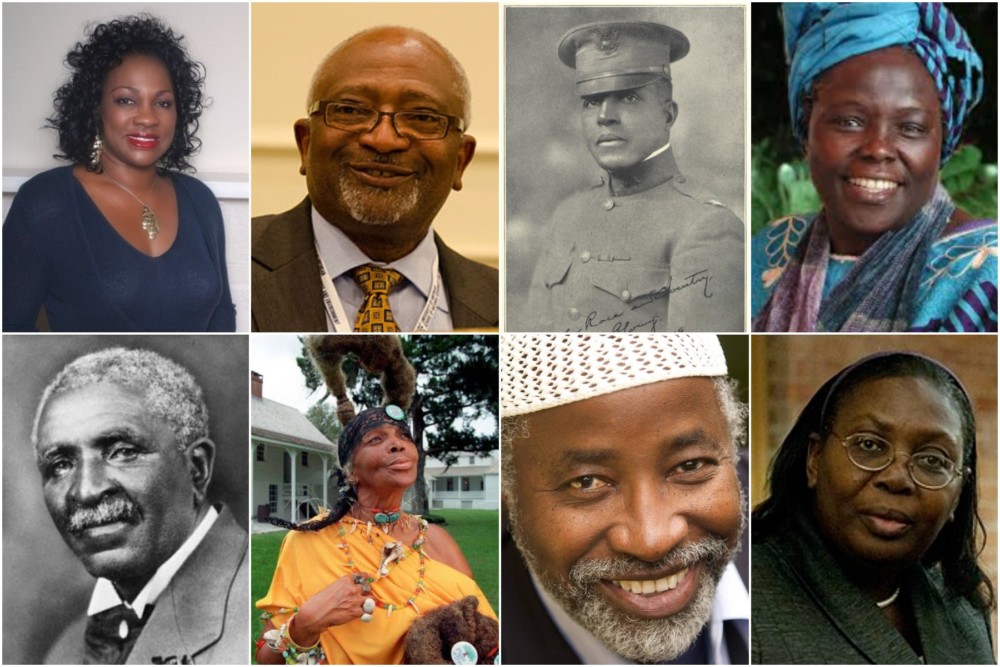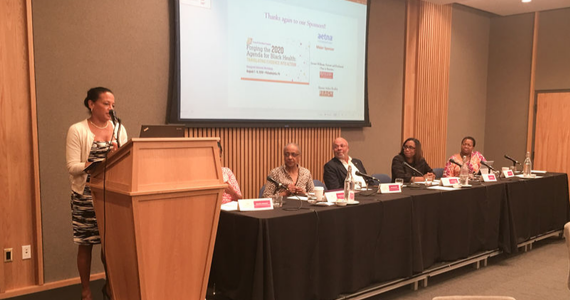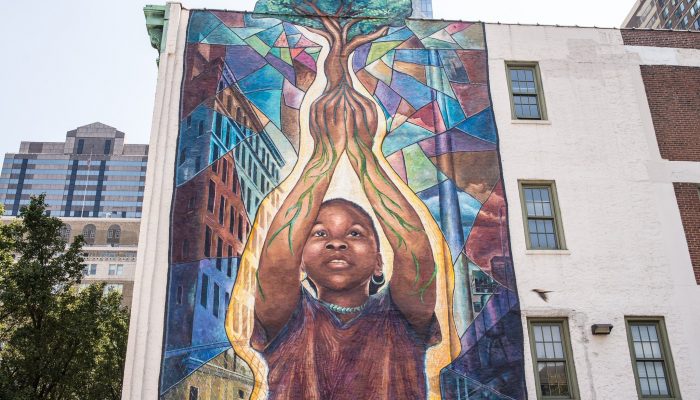 8 Black Environmentalists Who Made History [Green Philly]
8 Black Environmentalists Who Made History [Green Philly]
It’s Black History Month. Let’s reflect on environmentalists who revolutionized environmental justice. Not only does the sustainability movement face greenwashing, it is often whitewashed as well. Many Black environmental leaders rarely receive the same attention as non-Black scholars and activists.
Here are a few of the people who have made huge impacts in environmental fields, making history with their achievements and advocacy while fighting racism.
 For more than 33 years, The African American Children's Book Project (AACBP) has worked to promote and preserve children's literature written by or about African Americans. Literacy can open a world of of opportunities for children, and early access to diverse books plays an important role in building lifelong readers. Join AACBP this month at their annual children's book fair to see award-winning authors and illustrators read and autograph their books, browse a wide selection of books appropriate for children in preschool through to young adulthood, and enter for promotional giveaways, prizes, and games.
For more than 33 years, The African American Children's Book Project (AACBP) has worked to promote and preserve children's literature written by or about African Americans. Literacy can open a world of of opportunities for children, and early access to diverse books plays an important role in building lifelong readers. Join AACBP this month at their annual children's book fair to see award-winning authors and illustrators read and autograph their books, browse a wide selection of books appropriate for children in preschool through to young adulthood, and enter for promotional giveaways, prizes, and games.
 The African American Museum in Philadelphia
The African American Museum in Philadelphia
Founded in 1976 in celebration of the nation's Bicentennial, the African American Museum in Philadelphia (AAMP) is the first institution funded and built by a major municipality to preserve, interpret and exhibit the heritage of African Americans. Throughout its evolution, the museum has objectively interpreted and presented the achievements and aspirations of African Americans from pre-colonial times to the current day.
The museum is committed to telling the story of African Americans in all its permutations: family life, the Civil Rights movement, arts and entertainment, sports, medicine, architecture, politics, religion, law and technology. The AAMP currently houses four galleries and an auditorium, each of which offer exhibitions anchored by one of our three dominant themes: the African Diaspora, the Philadelphia Story, and the Contemporary Narrative.

The 2022 inaugural conference of the Council on Black Health (CBH), a program hosted at the Dornsife School of Public Health [in September 2019], began with an embrace of African tradition, expressed through dance, a perfect setting for keynote speaker Joia Crear Perry, MD, president of the National Birth Equity Collaborative in New Orleans and Co-Founder of the Health Equity Cypher. Perry’s talk “Igniting the Flame: Decolonization of Health,” highlighted the many ways the health of people of African-descent has been negatively impacted by generations of racism that have shaped medical and other health research, treatment, policies and practice in the United States.
 Things to Do for Black History Month in Philadelphia
Things to Do for Black History Month in Philadelphia
Black history and culture are a vital part of Greater Philadelphia’s past, present and future. The City of Brotherly Love and Sisterly Affection celebrates Black culture all year long, and Black History Month offers a special opportunity to commemorate the many contributions of Black figures throughout history and reflect on a just and more equitable future for all.
See also: 60+ Great Black-Owned Shops and Boutiques in Greater Philadelphia
 Celebrate Black History Month at the Free Library of Philadelphia
Celebrate Black History Month at the Free Library of Philadelphia
What does it mean to observe Black History Month? Is it just about dates, names, and events...or is it more than that? This annual dedication of time allows for a purposeful moment to pay tribute to the generations of African Americans, the struggles, the triumphs, and the hope for progress and an inspiring future.
Join the Free Library of Philadelphia as we share with one another the phenomenal talents, works, and achievements of the Black community from both Philadelphia and around the world. The Free Library has a calendar of events and activities highlighting the vast diversity of the African American experience. Learn even more via the Free Library Foundation.
Founded by Charles Blockson, the Charles L. Blockson Afro-American Collection at Temple University is one of the most prestigious collections of African American artifacts in the U.S. The collection houses over 500,000 items relating to the global Black experience. Located in Sullivan Hall on Temple's campus in North Philadelphia, the extensive catalog dates from 1581 to the present. Blockson donated his collection to Temple in 1984.
“My main goal in life is to build a good library of Black history — knowledge is a form of Black power and this is my part in it.” - Charles L. Blockson [pictured]
Paul Leroy Robeson was a Renaissance man who spent most of his life fighting injustice, for which he was roundly persecuted. He was an actor, orator, athlete, lawyer, singer, author, scholar, activist and linguist. Most of all, the “tallest man in the forest” – he stood 6-foot-3 – was an authentic American Hero.
Celebrating the life and legacy of Paul Robeson, the house is one of several centers devoted to his life, including the Paul Robeson Cultural Center at Rutgers University (where he was an All-American athlete), Paul Robeson Cultural Center at Pennsylvania State University and the Paul Robeson House of Princeton.
The Roots Picnic [Wikipedia] is an annual music festival created and hosted by hip hop group, The Roots. Co-founder, Shawn Gee, and manager of The Roots serves as executive producer of the festival. The festival is held in Philadelphia, their hometown at the Mann at Fairmount Park. The first festival was held on June 7, 2008.
 Marion Stokes didn’t begin videotaping until her thirties, but throughout her life, she was clearly an archivist and documentarist. For nearly twenty years, she was a librarian with the Free Library of Philadelphia and a co-producer of Input, a Sunday-morning talk show that brought together “academics, community and religious leaders, activists, scientists, and artists” to discuss social justice issues (Atlas Obscura). It was likely through this that she likely found a deep appreciation for creating and preserving media for social change.
Marion Stokes didn’t begin videotaping until her thirties, but throughout her life, she was clearly an archivist and documentarist. For nearly twenty years, she was a librarian with the Free Library of Philadelphia and a co-producer of Input, a Sunday-morning talk show that brought together “academics, community and religious leaders, activists, scientists, and artists” to discuss social justice issues (Atlas Obscura). It was likely through this that she likely found a deep appreciation for creating and preserving media for social change.
 Wanamaker organ and Black history: With the teaching of Black history now under attack, we should embrace our city’s connections to African American culture
Wanamaker organ and Black history: With the teaching of Black history now under attack, we should embrace our city’s connections to African American culture
In April 1928, the Wanamaker organ was a star feature of a weeklong series of events during "Negro Achievement Week" when the leading lights of the Harlem Renaissance came to Germantown. Negro Achievement Week was the brainchild of historian Carter G. Woodson, and it is the forerunner of what has become Black History Month. Philadelphia hosted the third such weeklong celebration of African American arts and letters. Each night’s programs focused on a topic, and Monday’s musical theme featured acclaimed organ soloist Harry T. Burleigh playing the Wanamaker organ.
